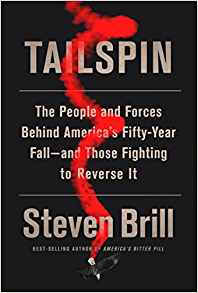
I’ll be honest. When Fritz Mondale handed me this book last June on our annual Canadian fishing trip, saying “Here. You might learn something,” being assigned a book by the former Vice President, Ambassador, Senator, and Minnesota Attorney General is not something you turn down. I was raised to do the work. So, with respect to Brill’s lengthy dissertation on what’s ailing America, I dutifully completed my assignment. And yes, I did learn a thing or two along the way.
Brill begins his discussion of where we are as a nation by a taking a long and extended historical tour of a number of major political themes. First, and this was the hardest slog in the tome, he takes the reader back through the causes of the Great Recession of 2007, detailing the “why” of the massive failure of the American lending and mortgage system. He takes aim not, as many conservatives are want to do, at the home buyers who overreached and obtained homes and attendant loans that they could never afford, but the system of Gerry-rigged lending policies, reinsurance, and derivative markets that made a few folks rich for making bad loans, impoverished millions, and cost the federal government tons of cash in the form of bailouts. His main theme in this light, however, turns out not to be the blame he casts on those who orchestrated the disaster: his ire is aimed at a federal government who has no problem incarcerating poor folks and folks of color for minor drug crimes but that does nothing, in terms of punishment and prison, for those who take financial advantage of the weak and helpless. Mortgage brokers don’t go to prison: they pay fines or minimal “clawbacks” under Dodd-Frank, a remedy that itself is in serious jeopardy of vanishing in the era of “Let them Fail” Trump.
Brill’s evaluation of our broken democracy turns to a dissection of national discourse and politics with a detailed examination of the big and dark money allowed by the Citizens United decision but aptly points out that the movement to unregulated commercial speech began decades before the Supreme Court released that fateful decision. Academic types of a Libertarian stripe had long argued that the 1st Amendment wasn’t meant to protect the speaker; it was meant to protect the listener by allowing him or her to hear every sort of message, even those corrupted and driven by greed. The author couples his exhaustive review of this warped and seemingly benign view of freedom with the mean-spirited politics of the Right brought to fruition by Newt Gingrich in the 1990s, when that hard boiled, loud mouthed, self-promoting professor left his post at a sleepy little Southern college and burst onto the American political scene. It was Gingrich, a minority member of Congress, who first recognized the power of reality television, something the current Orange Headed wonder has become a master of manipulating:
Gingrich soon latched onto a new tool to boost his profile. A few months after he took office in 1979, the House allowed the cable news industry to launch a public service channel, C-Span, to televise Hose proceedings. For years, members had gone to the floor…but would be seen and heard only by a handful of members…Gingrich realized, he and his allies could give the same speeches to a nationwide audience.
Brilliant and, unfortunately, the beginning of the nastiest streak in American politics we’ve ever endured. Brill has ample disdain for the Left as well, castigating Bill Clinton and a host of others for allowing legislation and federal regulations that have weakened unions, minority voting rights, welfare protections for our most vulnerable citizens, protections against predatory lenders, environmental guardrails, and the like. He not only blames the politicians: he blames the regulatory and judicial system that allows de minimus lawsuits based upon scant science to halt infrastructure projects and commercial developments, tying up needed improvements and modernization of the very fabric of America in lengthy, costly court battles. As an example of how it should work, he cites the 2009 bridge collapse in Minneapolis as a project that, when an emergent need arose, the federal government was able to erect a substantial project in months as opposed to years.
The complex story Brill tells is shocking and yet, certainly true in nearly every respect. The problem: he gives short shrift to a list of answers to solve the problems he raises. The final chapter contains optimism, optimism that, in my view, doesn’t ring quite true given the fix we, as Americans, of every political stripe, find ourselves in.
4 stars out of 5.
Peace.
Mark


